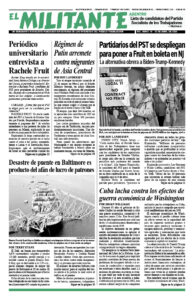HALIFAX, Nova Scotia — Unifor Local 100 members at Autoport in Eastern Passage voted to accept the latest company offer and return to work. The plant is a wholly owned subsidiary of Canadian National Railway. The deal provides 3%, 2.5% and 2.5% wage increases over a three-year contract, signing bonuses of 700 Canadian dollars ($515) now and CA$500 next January, an extra paid personal day and improvements to their pensions and vacations.
Under the old agreement, hourly wages ranged from CA$22.30 to CA$33.06. Autoport workers move about 185,000 vehicles on and off rail cars at Eastern Passage port annually, one of the biggest such operations in North America.
Autoport bosses had fought the strike from the beginning, getting an injunction limiting picketing and using scab labor.
“At first, I didn’t want to go on strike, but now we’re a lot tighter,” Harry Dort told the Militant. He said he’d been on strike once before, in a dispute in the herring fisheries in 1984.
“Our members made a really hard decision,” said Jennifer Murray, Atlantic regional director for Unifor. “We ratified a deal that was very similar to the tentative agreement” they had rejected earlier.
“I was on what we call the 2-8 a.m. ‘feed the raccoons’ picket shift, but I met so many great people through the strike,” said Heather Johnson, who began working there just days before the strike. Unifor Local 100 President Cory Will said, “We can take pride in knowing we fought back.”
The strikers won solidarity locally and nationwide. Kevin Piper, president of International Longshoremen’s Association Local 269 here, told the Militant, “We respected the picket line for 24 hours, then were served with an injunction for an illegal strike. With authorization from Unifor, we entered the facility as long as we didn’t do their work.”
Some 1,100 CUPE members in Montreal are in negotiations now, as are ILA dockworkers on the U.S. East Coast and Gulf ports.
Unifor organized solidarity picketing by rail workers in some cities, including in Montreal and Winnipeg. Militant worker-correspondents found widespread support for the strike going door to door with the paper in working-class neighborhoods.
— Félix Vincent Ardea,
CN conductor and member of the Teamsters Canada Rail Conference

